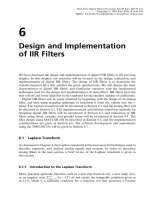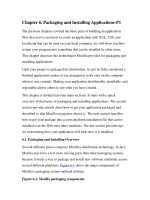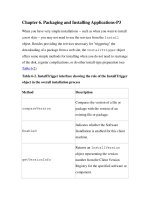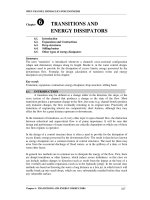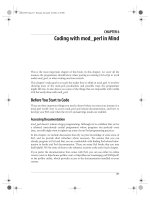Chapter 6: FUNCTIONS AND POINTERS IN C++
Bạn đang xem bản rút gọn của tài liệu. Xem và tải ngay bản đầy đủ của tài liệu tại đây (1.25 MB, 74 trang )
Chapter 6
FUNCTIONS AND POINTERS
Programming Fundamentals
1
Chapter 6
Function and parameter declarations
Returning values
Variable scope
Variabe storage classes
Pass-by-reference
Recursion
Passing arrays to functions
Pointers
The typedef declaration statement
Programming Fundamentals
2
Function and parameter declarations
User-defined program units are called subprograms. In C++ all
subprograms are referred to as internal functions.
A complex problem is often easier to solve by dividing it into several
smaller parts, each of which can be solved by itself.
These parts are sometimes made into functions
main() : functions to solve the original problem
Defining a Function: data_type name_of_function (parameters){
statements;
}
We could use also external functions (e.g., abs, ceil, rand, etc.)
grouped into specialized libraries (e.g., math, etc.)
Programming Fundamentals
3
A function definition consists of four parts:
A reserved word indicating the data type of the function’s return value.
The function name
Any parameters required by the function, contained within ( and ).
The function’s statements enclosed in curly braces { }.
Example :
int FindMax (int x, int y) {
int maximum;
if ( x > = y)
maximum = x;
else
maximum = y;
return maximum;
}
Advantages of function:
• separate the concept (what is done)
from the implementation (how it is done).
• make programs easier to understand.
• can be called several times in the same
program, allowing the code to be reused.
Programming Fundamentals
4
How to call functions
We have to designate a data type for function since it will return a
value from a function after it executes.
Variable names that will be used in the function header line are
called formal parameters.
To execute a function, you must invoke, or call it according to the
following syntax:
<function name>(<argument list>)
The values or variables that you place within the parentheses of a
function call statement are called actual parameters.
Example:
findMax( firstnum, secnum);
Programming Fundamentals
5
Function Prototypes
A function prototype declares to the compiler that we intend to use
a function later in the program.
If we try to call a function at any point in the program prior to its
function prototype or function definition, we will receive an error at
compile time.
The lines that compose a function within a C++ program are called a
function definition.
The function definition can be placed anywhere in the program
after the function prototypes.
If a function definition is placed in front of main(), there is no
need to include its function prototype.
Programming Fundamentals
6
Example:
// Finding the maximum of three integers
#include <iostream.h>
int maximum(int, int, int); // function prototype
int main() {
int a, b, c;
cout << "Enter three integers: ";
cin >> a >> b >> c;
cout << "Maximum is: " << maximum (a, b, c) << endl;
return 0;
}
// Function maximum definition
// x, y and z are parameters
int maximum( int x, int y, int z) {
int max = x;
The output of the above program:
if ( y > max )
max = y;
if ( z > max )
max = z;
Enter three integers: 22 85 17
return max;
Maximum is: 85
}
Programming Fundamentals
7
Note: it is possible to omit the function prototype if the function
definition is placed before it is called.
Example:
// Finding the maximum of three integers
#include <iostream.h>
// Function maximum definition with parameters x, y and z
int maximum( int x, int y, int z) {
Note: there is one-to-one
int max = x;
correspondence between
if ( y > max )
max = y;
the arguments in a
if ( z > max )
max = z;
function call and the
return max;
parameters in the function
}
definition.
int main() {
int a, b, c;
cout << "Enter three integers: ";
cin >> a >> b >> c;
cout << "Maximum is: " << maximum (a, b, c) << endl;
return 0;
}
Programming Fundamentals
8
Passing by Value
If a variable is one of the actual parameters in a function call,
the called function receives a copy of the values stored in the
variable.
After the values are passed to the called function, control is
transferred to the called function.
Example: The statement findMax(firstnum, secnum); calls the
function findMax() and causes the values currently residing in the
variables firstnum and secnum to be passed to findMax().
The method of passing values to a called function is called
pass by value.
Programming Fundamentals
9
RETURNING VALUES
To actually return a value to a variable, you must
include the return statement within the called
function.
The syntax for the return statement is either
return value;
or
return(value);
Values passes back and forth between functions
must be of the same data type.
Programming Fundamentals
10
Inline function
For small functions, you can use the inline keyword to request that
the compiler replace calls to a function with the function definition
wherever the function is called in a program.
Example:
// Using an inline function to calculate the volume of a cube.
#include <iostream.h>
inline double cube(double s) { return s * s * s; }
int main()
{
cout << "Enter the side length of your cube: ";
double side;
cin >> side;
cout << "Volume of cube with side "
<< side << " is " << cube(side) << endl;
return 0;
}
Programming Fundamentals
11
Function Overloading
C++ enables several functions of the same name to be defined,
as long as these functions have different sets of parameters (at
least their types are different).
This capability is called function overloading.
When an overloaded function is called, the compiler selects the
proper functions by examining the number, types and order of
the arguments in the call.
Function overloading is commonly used to create several
functions of the same name that perform similar tasks but on
different data types.
Programming Fundamentals
12
Example:
void showabs(int x)
{
if( x < 0)
x = -x;
cout << “The absolute value of the integer is “ << x << endl;
}
void showabs(double x)
{
if( x < 0)
x = -x;
cout << “The absolute value of the double is “ << x << endl;
}
If the function calls “showabs(10);”,
then it causes the compiler to use the 1st version of the
function showabs.
Programming Fundamentals
13
Default arguments
C++ allows default arguments in a function call.
Default argument values are listed in the function prototype and
are automatically passed to the called function when the
corresponding arguments are omitted from the function call.
Example: The function prototype
void example (int, int = 5, float = 6.78);
provides default values for the two last arguments.
If any of these arguments are omitted when the function is actually
called, compiler supplies these default values.
example(7,2,9.3);
// no default used
example(7,2);
// same as example(7, 2, 6.78)
example(7);
// same as example(7, 5, 6.78)
Programming Fundamentals
14
VARIABLE SCOPE
Recall:
A sequence of statements within { … } is considered a block of
code. The part of the program where you can use a certain
identifier (variable or constant) is called the scope of that identifier.
Scope refers to where in your program a declared identifier is
allowed used.
The scope of an identifier starts immediately after its declaration
and ends when the “innermost” block of code within which it is
declared ends.
It is possible to declare the same identifier in another block within
the program.
Global scope refers to variables declared outside of any functions
or classes and that are available to all parts of your program.
Local scope refers to a variable declared inside a function and
that is available only within the function in which it is declared.
Programming Fundamentals
15
Example:
#include <iostream.h>
int x;
// create a global variable named firstnum
void valfun(); // function prototype (declaration)
int main()
{
int y;
// create a local variable named secnum
x = 10;
// store a value into the global variable
y = 20;
// store a value into the local variable
cout << "From main(): x = " << x << endl;
cout << "From main(): y = " << y << endl;
valfun();
// call the function valfun()
cout << "\nFrom main() again: x = " << x << endl;
cout << "From main() again: y = " << y << endl;
return 0;
}
Programming Fundamentals
16
void valfun() {
int y;
// create a second local variable named y
y = 30;
// this only affects this local variable's value
cout << "\nFrom valfun(): x = " << x << endl;
cout << "From valfun(): y = " << y << endl;
x = 40;
// this changes x for both functions
return;
}
The output of the above program:
From main(): x = 10
From main(): y = 20
From valfun(): x = 10
From valfun(): y = 30
From main() again: x = 40
From main() again: y = 20
Programming Fundamentals
17
Scope Resolution Operator
When a local variable has the same name as a
global variable, all uses of the variable’s name
within the scope of the local variable refer to the
local variable.
In such cases, we can still access to the global
variable by using scope resolution operator (::)
immediately before the variable name.
The :: operator tells the compiler to use the global
variable.
Programming Fundamentals
18
Example :
#include <iostream.h>
float number = 42.8;
// a global variable named number
int main()
{
float number = 26.4; // a local variable named number
cout << "The value of number is " << ::number << endl;
return 0;
}
The output of the above program:
The value of number is 42.8
Programming Fundamentals
19
VARIABLE STORAGE CLASS
The lifetime of a variable is referred to as the storage
duration, or storage class.
Four available storage classes: auto, static, extern and
register.
If one of these class names is used, it must be placed
before the variable’s data type in a declaration statement.
Examples:
auto int num;
static int miles;
register int dist;
extern float price;
extern float yld;
Programming Fundamentals
21
Local Variable Storage Classes
Local variables can only be members of the auto,
static, or register storage classes.
Default: auto class.
Automatic Variables
The term auto is short for automatic.
Automatic storage duration refers to variables that
exist only during the lifetime of the command block
(such as a function) that contains them.
Programming Fundamentals
22
Example:
include <iostream.h>
void testauto(); // function prototype
int main(){
int count;
// count is a local auto variable
for(count = 1; count <= 3; count++)
testauto();
return 0;
}
void testauto(){
int num = 0; // num is a local auto variable
cout << "The value of the automatic variable num is "
The output of the above program:
<< num << endl;
num++;
The value of the automatic variable num is 0
return;
The value of the automatic variable num is 0
}
The value of the automatic variable num is 0
Programming Fundamentals
23
Local static variables
In some applications, we want a function to remember
values between function calls. This is the purpose of the
static storage class.
A local static variable is not created and destroyed each
time the function declaring the static variable is called.
Once created, local static variables remain in existence
for the life of the program.
However, locally declared identifiers cannot be accessed
outside of the block they were declared in.
Programming Fundamentals
24
Example:
#include <iostream.h>
int funct(int); // function prototype
int main()
{
int count, value;
// count is a local auto variable
for(count = 1; count <= 10; count++){
value = funct(count);
cout << count << ‘\t’ << value << endl;
}return 0;
}
int funct( int x)
{
int sum = 100;
sum += x;
return sum;
}
// sum is a local auto variable
Programming Fundamentals
25
The output of the above program:
1
2
3
4
5
6
7
8
9
10
101
102
103
104
105
106
107
108
109
110
Note: The effect of increasing sum in funct(), before the function’s
return statement, is lost when control is returned to main().
Programming Fundamentals
26


